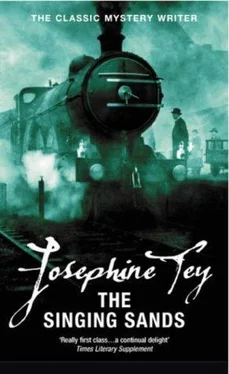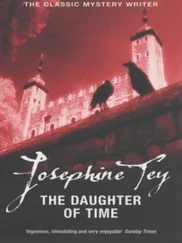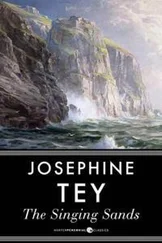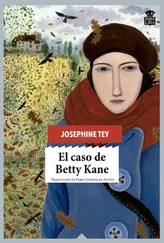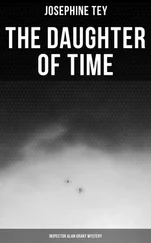Was that what Bill Kenrick had seen when he came out of the solid brown cloud of sand that had blinded and buffeted him? Empty palaces in the sand? Was that what he had gone out of his way to look for—perhaps to look at —when he ‘began to come in late as a habit’?
He had said nothing after that first experience. And that, if what he had seen was a city in the sand, was understandable . He would have been teased about it: teased about mirages, and one over the eight, and what not. Even if any of the OCAL boys had ever heard the legend—and in so shifting, so easy-come a crowd it was unlikely—they would still have teased him about wish-fathered ideas. So Bill, who wrote those tight-closed M’s and N’s and was ‘just a bit cagey’, said nothing and went back to have another look. Went back again and again. Either because he wanted to find the place he had seen, or to look at a place he had already pin-pointed.
He studied maps. He read books about Arabia. And then—?
Then he decided to come to England.
He had arranged to go to Paris with Tad Cullen. But instead he wanted a little time by himself in England. He had no people in England. He had not been in England for years, and according to Cullen had never seemed homesick for the place nor written to anyone there in any kind of regular correspondence. He had been brought up by an aunt when his parents were killed and she too was now dead. He had never until then had any desire to go back to England.
Grant sat back and let the stillness fall round him. He could almost hear the dust coming to rest. Year after year the dust falling in the quiet. Like Wabar.
Bill Kenrick came to England. And about three weeks later, when he is due to meet his friend in Paris, he turns up in Scotland as Charles Martin.
Grant could imagine why he wanted to come to England, but why the masquerade? Why the flying visit to the North?
Whom was he going to visit as Charles Martin?
He could have paid that flying visit and still have met his friend in Paris on the appointed date if it had not been for the accident of his tipsy fall. He could have interviewed someone in the Highlands and then flown from Scoone to meet his friend at the Hotel St Jacques for dinner.
But why as Charles Martin?
Grant put the books back on their shelf with an approving pat that he had never wasted on the Hebrides selection, and went to call on Mr Tallisker in his little office. He had at least got his line on Kenrick. He knew how to cross his trail.
‘Who would you say was the greatest authority on Arabia in England today?’ he asked Mr Tallisker.
Mr Tallisker waved his beribboned pince-nez and smiled in a deprecating way. There were what might be termed a swarm of successors to Thomas and Philby and the other great names, he said, but he supposed that only Heron Lloyd ranked as a really great authority. It was possible that he, Mr Tallisker, was prejudiced in Lloyd’s favour because he was the only one of the crowd who wrote English that was literature, but it was true that apart from his gifts as a writer he had stature and integrity and a great reputation. He had done some spectacular journeys in the course of his various explorations, and had considerable standing among the Arabs.
Grant thanked Mr Tallisker and went away to look up Who’s Who . He wanted Heron Lloyd’s address.
Then he went to have a meal; and instead of going to the Caledonian, which was convenient and sufficiently bestarred, he obeyed an obscure impulse and walked to the other side of the town so that he could eat where he had eaten breakfast with the shade of B Seven on that dark morning only a few weeks ago.
There was no half-fit gloom in the dining-room today; the place was starched and shining, silver, glass and linen. There was even a shirt-front where a head waiter hovered. But there was also Mary; calm and comfortable and plump as she had been that morning. He remembered how in need of soothing and reassurance he had been, and could hardly believe that that tortured and exhausted creature could have been himself.
He sat down at the same table, near the screens in front of the service door, and Mary came to take his order and to ask how the fishing on the Turlie was these days.
‘How did you know I was fishing the Turlie?’
‘You were with Mr Rankin when you came in for breakfast, off the train.’
Off the train. He had come off the train after that night of conflict and suffering; that loathsome night. He had come off the train, leaving B Seven dead there with a casual glance and a passing moment of regret. But B Seven had paid back a hundred-fold that moment of easy compassion. B Seven had come with him and in the end had saved him. It was B Seven who had sent him to the Islands, on that mad, cold, blown search for nothing. In that strange absurd limbo he had done all those things that he could never have done elsewhere; he had laughed till the tears ran, he had danced, he had let himself be flung about like a leaf from one empty horizon to the next, he had sung, he had sat still and looked. And he had come back a whole man. He owed B Seven more than he could ever repay.
He thought about Bill Kenrick while he had his luncheon; the young man who had had no roots. Had he been lonely in his unattached life, or just free? And if free, was it a swallow’s freedom, or an eagle’s? A sun-seeking skimming, or a soaring lordliness?
At least he had had a trait that in all climes and ages has been both rare and endearing: he was the man of action who was also by instinct a poet. It was what distinguished him from the light-come crowds of OCAL employees who span their airy patterns across the continents as unthinking as mosquitoes. It was what distinguished him from the milling five-o’clock crowds in a London railway station to whom adventure was half-a-crown each way. If the dead boy in B Seven had been neither a Sidney nor a Grenfell, he had at least been of their kind.
And for that Grant loved him.
‘You know,’ said that voice in him, ‘if you don’t take care you’ll develop a “thing” about Bill Kenrick.’
‘I’ve got it already,’ he said cheerfully; and the voice retired in a defeated silence.
He over-tipped Mary and went away to book two seats on the morning plane to London. He had still more than a week of holiday to come and the Turlie still swarmed with fish, beautiful silver clean-run fighting fish, but he had other business. Since yesterday afternoon he had only one business: Bill Kenrick.
He had qualms about that air journey to London, but not very serious qualms. He could hardly recognise, when he looked back at him, that demon-ridden frightened creature who had stepped down on to Scoone platform from the London mail less than a month ago. All that was left of that deplorable object was a slight fear of being afraid. The terror itself was no longer there.
He bought enough sweets for Patrick to keep him sick for three months on end, and drove back to the hills. He was afraid that the sweets were a little too elegant to please Patrick entirely—a little too ‘jessie-like’ perhaps? — since Pat’s avowed favourites were something in Mrs Mair’s window labelled Ogo-Pogo Eyes. But Laura would no doubt dole out the Scoone ones in driblets anyway.
He halted the car above the river, half-way between Moymore and Scoone, and went down across the moor to look for Tad Cullen. It was still early afternoon and he would not yet have finished his after-luncheon spell on the river.
He had not yet begun it. As Grant came to the edge of the moor and looked down at the river’s immediate hollow, he saw below him in the mid-distance a small group of three persons, idle and relaxed on the bank. Zoë was propped in her favourite position against a rock, and on either side of her, on a level with her crossed feet and gazing at her with an unwavering attention, were her two followers: Pat Rankin and Tad Cullen. Looking at them, amused and indulgent, Grant became aware that Bill Kenrick had done him a final service for which he had not yet had credit. Bill Kenrick had saved him from falling in love with Zoë Kentallen.
Читать дальше
